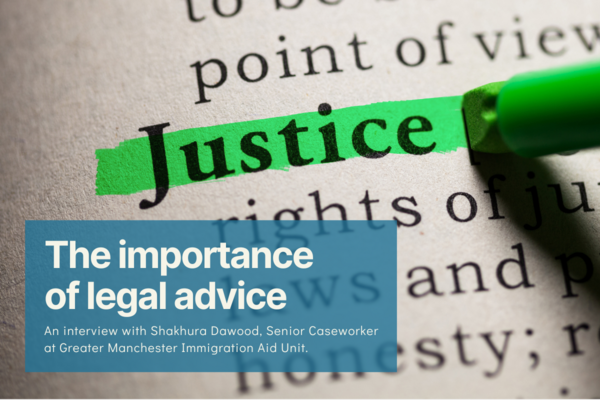Shakhura Dawood is a Senior Caseworker at GMIAU (Greater Manchester Immigration Aid Unit). She has over two decades of experience providing legal advice relating to immigration and asylum cases. We recently interviewed Shakhura about her work and the longstanding partnership between our two organisations.
You often support people we work with who have been refused asylum. What are some of the reasons someone’s asylum claim might be refused?
How long have you got for me to answer this! It could be that in the initial stages all the information has not been presented to the Home Office. Clients might be badly advised or do not meet the criteria of the 1951 Refugee Convention.
They might lack legal representation. For example, their case might not meet the merit test for them to continue to be eligible for legal aid at an appeal stage and therefore they go unrepresented at a hearing. Other reasons could include nationality or age disputes. Similarly, the facts of the case could be disputed - for example, cases based on sexuality or religious conversion might not be accepted.
For someone facing destitution, how easy is it for them to engage in the process of regularising their immigration status? What are some of the barriers to them accessing legal advice?
The number of providers offering good quality legal advice is much reduced and so it is very difficult to refer clients to other providers. Fresh claims work can also be seen as demanding, given that the clients have been refused once already. Providers can therefore be unwilling to take on such cases.
Gathering evidence to support a fresh claim can be difficult because in some instances there is a lack of knowledge around the fresh claims test or even understanding of why their cases were refused in the first instance.
If clients are experiencing homelessness, it can be difficult to gain access to their previous files. Sometimes lack of money can make it difficult to gather the evidence they need – for example, arranging appointments, contacting supporting witnesses or contacting family and friends abroad to help gather evidence. Lack of IT knowledge, access to a mobile phone or a quiet space with internet for remote meetings to take place can also be a barrier for people.
What difference does having safe, stable accommodation make for the people you work with in terms of progressing their legal cases?
It makes a massive difference – the individual is supported, they are attending an appointment that they know about and have been prepared for and they know what the purpose of the appointment is. Very often, people living in Boaz accommodation are supported to appointments by members of staff which makes the meetings run smoothly and any action plans agreed are known to all involved.
Having a safe place to stay means that people don’t have to constantly think about where their next place of shelter is going to be. It has a positive impact on wellbeing, meaning they are more able to engage with their asylum case. Practically, having an address means that receiving post and storing immigration papers is much easier.





